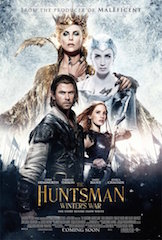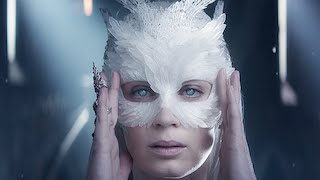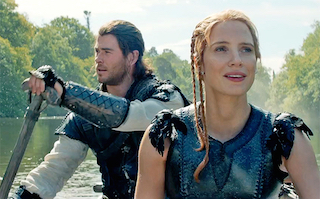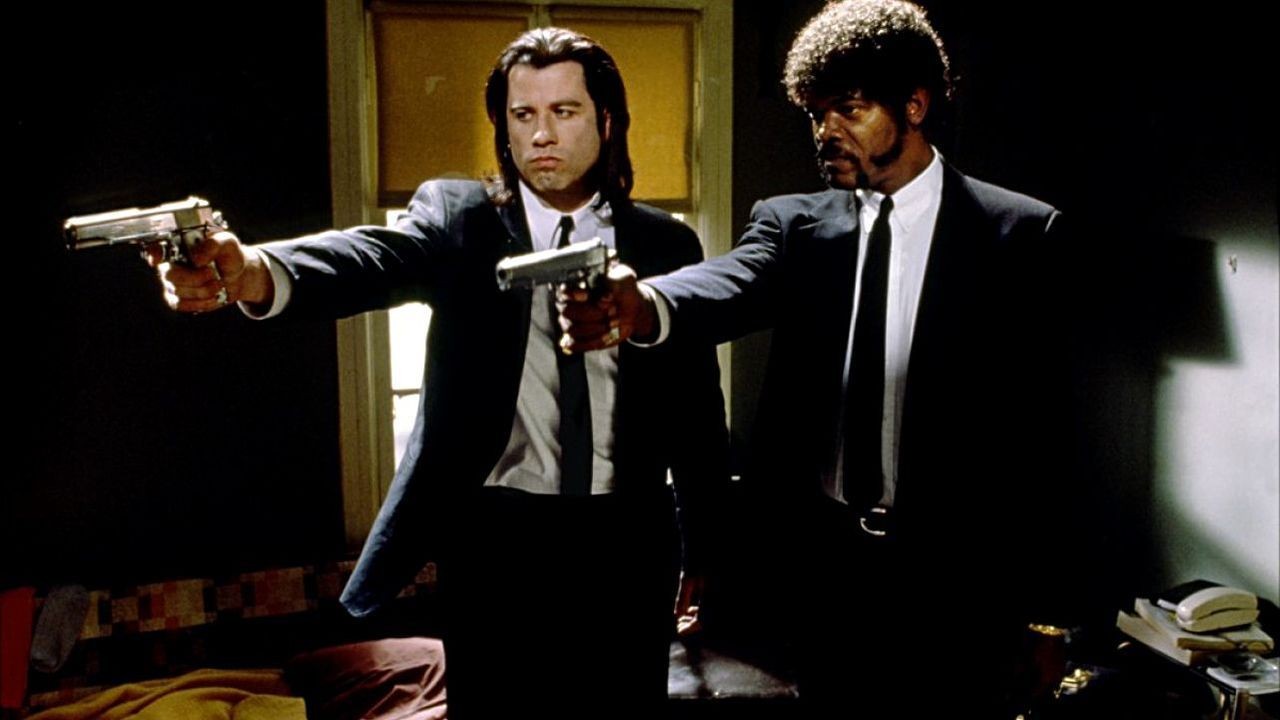 I loved Snow White and the Huntsman, it was a lovely, dark take on the age-old story that expanded the original world into a bigger place for the imagination to dwell. You can read my review for it right here.
I loved Snow White and the Huntsman, it was a lovely, dark take on the age-old story that expanded the original world into a bigger place for the imagination to dwell. You can read my review for it right here.
My favorite character was the Huntsman, and no, not because he’s hunky Chris Hemsworth aka Thor, but because I am often drawn in by broken characters with rough edges. When we meet the Huntsman in the first film, he’s filthy, drunk, angry, and heartbroken. This movie delivers its promise of showing you his story before that film, but the unexpected twist is that this film is actually more of a sequel than a prequel. Can’t say I was expecting that!
The Huntsman: Winter’s War received pretty poor reviews, and maybe it’s just me having a garbage moment, but I don’t think it was “bad.” It wasn’t as good as its predecessor, but it was fun, beautiful, and had interesting themes despite its rather thin plot.
It begins, as the trailer implies, with the wicked Queen Ravena (Charlize Theron), and her sister Freya (Emily Blunt). Freya has fallen in love with a young lord and in secret, they have conceived a child. Ravenna, as we find out later, was told by her magic mirror that this child would grow to be more beautiful than she, and thus has decided to rid them of it. She frames Freya’s lover to look as though he murdered their child by setting fire to the nursery where she slept.
The pain of her loss brings out grief, anger, and a long sleeping magic inside of Freya. She becomes the Ice Queen. She is far more the epic snow queen of old fairytales than Disney’s Elsa ever would be on her darkest day. I loved seeing Blunt in this brutally cold, controlling role, even though it was a little underwhelming by the end of the film.
Freya takes it upon herself to “save” all the children of the world, one kingdom at a time. After conquering their land or village, she takes them in as her own and teaches them to fight. They will become her army, and the will be protected and cared for, all their needs met. The only catch is that they are forbidden to love, any kind of love. She says with an icy slither in her voice, “Do not love. It is a sin, and I will not forgive it.”
 This really caught me. I was expecting something from this character more along the lines of revenge, to raise an army to avenge the death of her child, or out of anger to destroy the world. In the Hans Christian Andersen original story, the Snow Queen takes a boy, and in other variations, she takes many children. Winter’s War does its own take on the source material in Freya’s army. Basically, her army is a controlled society she calls her children, and since she sees love as a destructive weakness, she makes a law in which love is punishable by death. She thinks she is doing them a courtesy, but of course, she is simply hiding behind her own pain and fear.
This really caught me. I was expecting something from this character more along the lines of revenge, to raise an army to avenge the death of her child, or out of anger to destroy the world. In the Hans Christian Andersen original story, the Snow Queen takes a boy, and in other variations, she takes many children. Winter’s War does its own take on the source material in Freya’s army. Basically, her army is a controlled society she calls her children, and since she sees love as a destructive weakness, she makes a law in which love is punishable by death. She thinks she is doing them a courtesy, but of course, she is simply hiding behind her own pain and fear.
Eric, the Huntsman, has a rebellious side revealed early on when he teaches one of the new children how to have a “mean face” in order to hide her true feelings from the queen. He says that’s what he does, so she doesn’t know what he is thinking. In Freya’s hard, cold world, he is a source of warmth and softness. But he’s not alone…
Sarah, another one of Freya’s kept children, not only feels the same way he does but is in a relationship with him. Sarah is his wife referred to in Snow White and the Huntsman. Here, they “marry” each other while bathing in a pool under the moonlight. Maybe it was just the Scottish accents or the secrecy, but it reminded me of the romance in Braveheart between William Wallace and his wife Murron. It’s simple, doesn’t need a lot of explanation, and is very sweet. Though we don’t see it much in this beginning, later on, we get some fun interaction between Sarah and Eric. Hemsworth and Chastain have a very natural chemistry; I just wish we could have seen more of it.
Through a cruel trick on the part of Freya, on the night of their planned escape together, Freya uses her magic to separate them forever. Freya cannot understand why they broke her law. She proclaims, “I gave you everything, and you betrayed me.” But the obvious truth is she is giving her children everything except the one thing they actually need, the greatest of these, love.
 Though the theme is a little hamfisted, Freya’s desolation and ice cold world isn’t just a physical state. They mention in the narration that the lands she made her kingdom were once the greenest and fertile of all the lands, and she deliberately chose to make them barren. In the same way, human beings are bound together by love, and she deliberately chooses to make love forbidden, which sterilizes a people from the inside out. When people think of cold-hearted, or icy as personality traits, they think of emotionlessness, but it’s so much deeper than that. In Freya’s cold and icy disposition, there is much emotion, but of only one kind. Winter is a season, and its death gives way to new life in spring. However, when all you have is winter, nothing can possibly ever grow. It stunts the natural order. Freya’s world isn’t birthed simply in anger, and despair, it is infertility, a barrenness of the soul.
Though the theme is a little hamfisted, Freya’s desolation and ice cold world isn’t just a physical state. They mention in the narration that the lands she made her kingdom were once the greenest and fertile of all the lands, and she deliberately chose to make them barren. In the same way, human beings are bound together by love, and she deliberately chooses to make love forbidden, which sterilizes a people from the inside out. When people think of cold-hearted, or icy as personality traits, they think of emotionlessness, but it’s so much deeper than that. In Freya’s cold and icy disposition, there is much emotion, but of only one kind. Winter is a season, and its death gives way to new life in spring. However, when all you have is winter, nothing can possibly ever grow. It stunts the natural order. Freya’s world isn’t birthed simply in anger, and despair, it is infertility, a barrenness of the soul.
As far as the technical proficiency, a couple of things stand out. Just like Snow White and the Huntsman, this film has a beautiful score composed by the ever talented James Newton Howard, and Collen Atwood crushes it with her costume design yet again.
Something I’d like to point out in the costumes is their modesty. Typically, we see overly sexualized get-ups in blockbuster films, but these choices seemed carefully and tastefully made. I know the word “modesty” typically gets redefined as prudish, but that’s not the case here. Even Ravenna, who uses seduction as a weapon, isn’t ostentatiously sexualized for the camera. The costumes are glorious and the ladies radiate in them. The costumes fit the characters and add to their presence, rather than distract. Intentional or not, I found it incredibly refreshing.
Overall, though it disappoints me to say so, this movie is really just another popcorn flick. The film had all the resources and potential, but like so many films being churned out of The Machine these days, it failed to live up to that potential to go deeper and reach further into the hearts of the audience. It’s too bad, but that doesn’t mean it’s a terrible movie. It’s simply a reflection of the times we live in in cinema.


